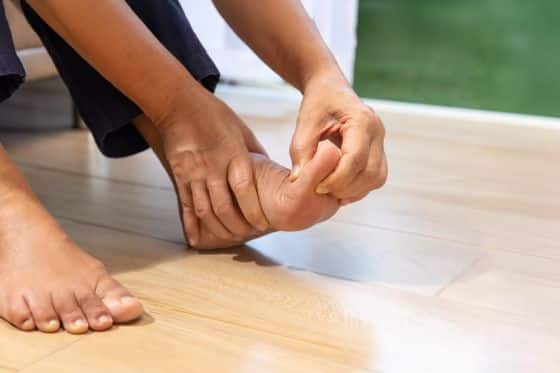Neuropathy is damage or dysfunction of one or more peripheral nerves that commonly causes burning, tingling and numbness. Early recognition, treating underlying causes (like diabetes), and lifestyle steps to support nerve health can reduce symptoms and slow progression.
What is neuropathy?
Neuropathy refers to disorders of the peripheral nerves — the network that carries signals between your spinal cord and the rest of your body. It can affect sensory nerves (feeling), motor nerves (movement) or autonomic nerves (organ function).
Symptoms often reflect which nerves are involved. People over 40 and those with long work histories commonly notice early sensory changes in the hands or feet.
Common symptoms to watch for
Symptoms vary by nerve type and severity, but these are the most frequent complaints:
- Burning pain: A persistent hot or stinging sensation, often worse at night.
- Tingling (pins-and-needles): Intermittent prickling sensations that may come and go.
- Numbness or loss of sensation: Reduced ability to feel temperature, touch or pain; increases risk of injury.
- Muscle weakness or cramping: When motor nerves are affected, coordination and strength can decline.
- Autonomic symptoms: Dizziness, bowel or bladder changes, or abnormal sweating if autonomic nerves are involved.
What causes neuropathy?
Many conditions can damage peripheral nerves. Common causes include:
- Diabetes: The leading cause of peripheral neuropathy in adults due to chronic high blood glucose levels.2
- Vitamin deficiencies: Low B12 and other B vitamins can impair nerve function.
- Toxins and medications: Alcohol misuse and some chemotherapy drugs can cause neuropathy.
- Autoimmune and inflammatory conditions: Guillain–Barré syndrome, rheumatoid arthritis and others can target nerves.
- Compression or injury: Repetitive strain, trauma or nerve entrapment (e.g., carpal tunnel) can produce focal neuropathies.
- Idiopathic: In some people no clear cause is found; this is called idiopathic neuropathy.
Treatment and symptom management
Treatment depends on the underlying cause and symptom severity.
- Treat the cause: Controlling blood sugar in diabetes or correcting vitamin deficiencies can slow or reverse symptoms in many cases.
- Medications for pain: Certain antidepressants (SNRIs), anticonvulsants and topical therapies are commonly used to reduce neuropathic pain. Discuss benefits and side effects with your clinician.
- Physical therapy and exercise: Strength, balance and gentle aerobic activity help maintain function and reduce pain flare-ups.
- Foot care and injury prevention: For those with sensory loss in the feet, daily inspection, protective footwear and immediate care for wounds are essential.
- Complementary approaches: Some people find relief from techniques such as transcutaneous electrical nerve stimulation (TENS), acupuncture and mindfulness-based pain management, though evidence quality varies.
Daily habits to support nerve health
Small, consistent lifestyle changes can protect nerves and improve quality of life.
- Manage chronic conditions: Keep diabetes, blood pressure and cholesterol under control through medication, diet and regular check-ups.
- Eat a nerve-friendly diet: A balanced diet rich in whole grains, lean protein, healthy fats and adequate B vitamins supports nerve repair.
- Stay active: Regular aerobic and resistance exercise improves circulation and nerve function.
- Avoid toxins: Limit alcohol and avoid exposure to known neurotoxins.
- Quit smoking: Smoking impairs circulation and slows nerve healing.
- Protect affected areas: Use cushioning or orthotics for foot problems and take breaks from repetitive hand tasks.
If moving around has started to feel more challenging, or if you’ve noticed changes in how your hands or feet respond, now is the perfect time to take action.
At MORGAiN Physical Therapy, we’re offering a free discovery visit—a relaxed one-on-one session where we’ll listen to your goals, answer your questions, and give you simple, supportive steps to move forward.
Call us today at (701) 599-3848 or click here to reserve your free discovery visit.
Spaces are limited, so don’t wait—this could be your first step toward moving with more confidence.
More Free Resources:
Read our blog – Understanding Tingling and Numbness in Feet and Hands: Natural Ways to Support Nerve Health – Morgain Physical Therapy
See where we are located: Google Maps

